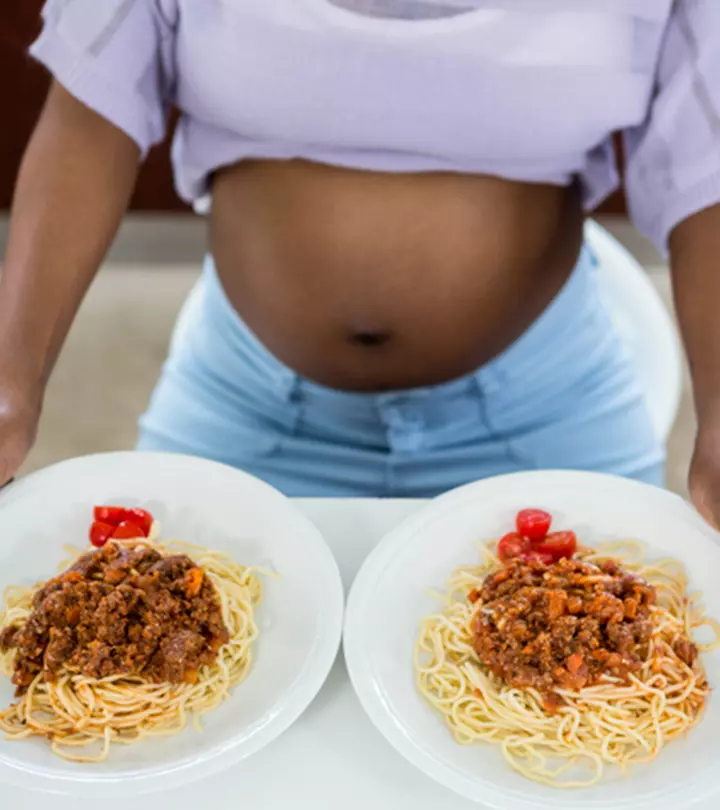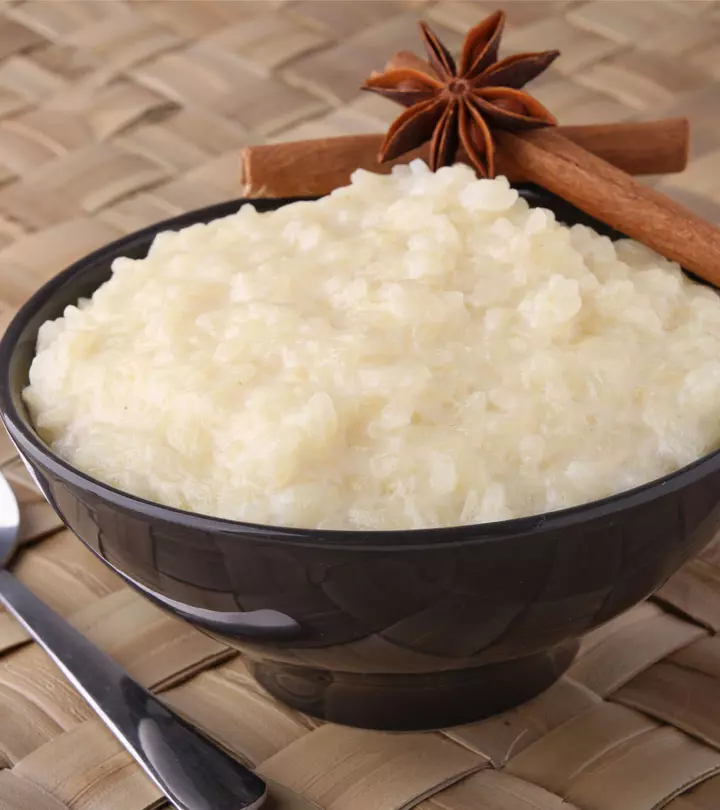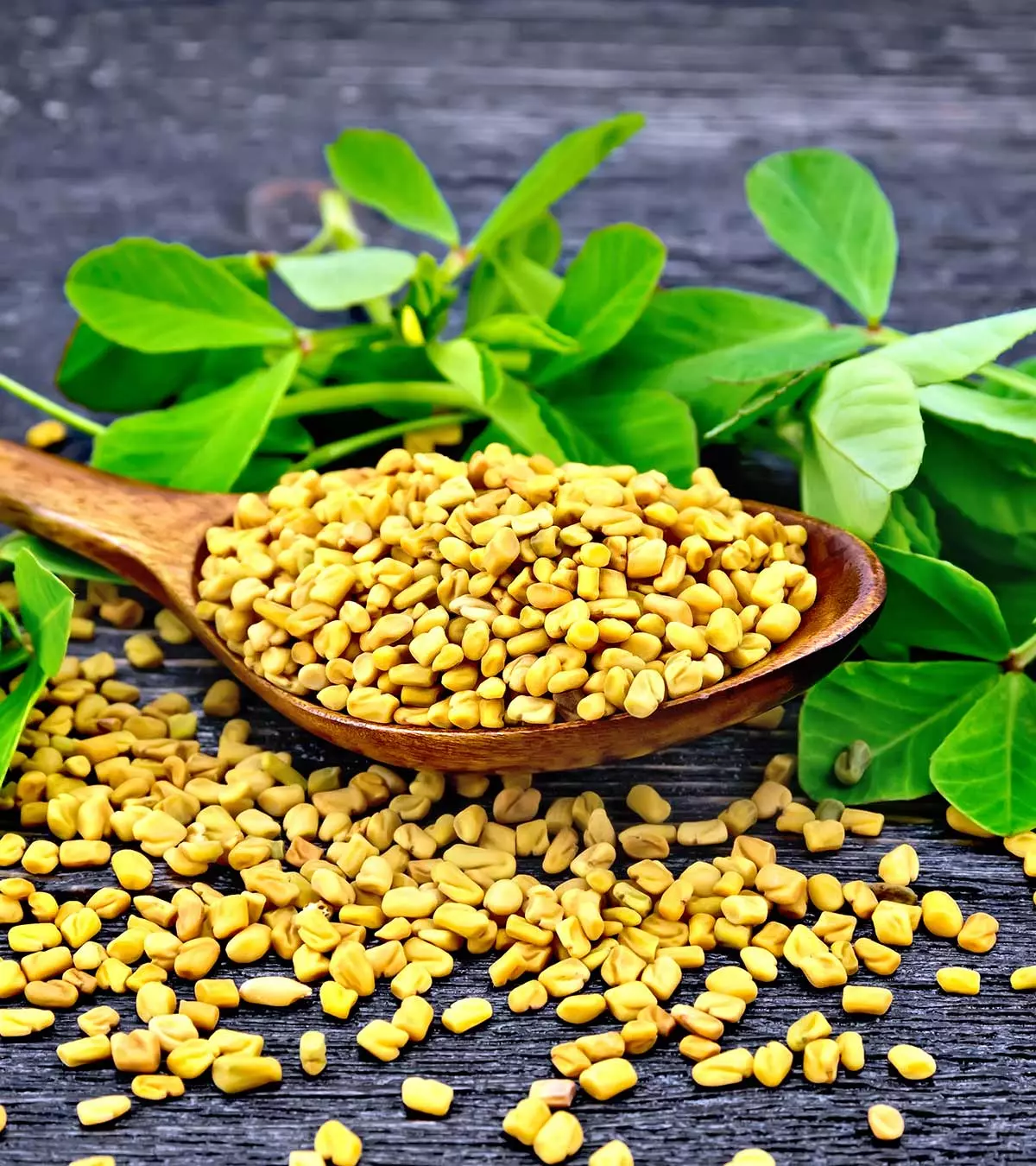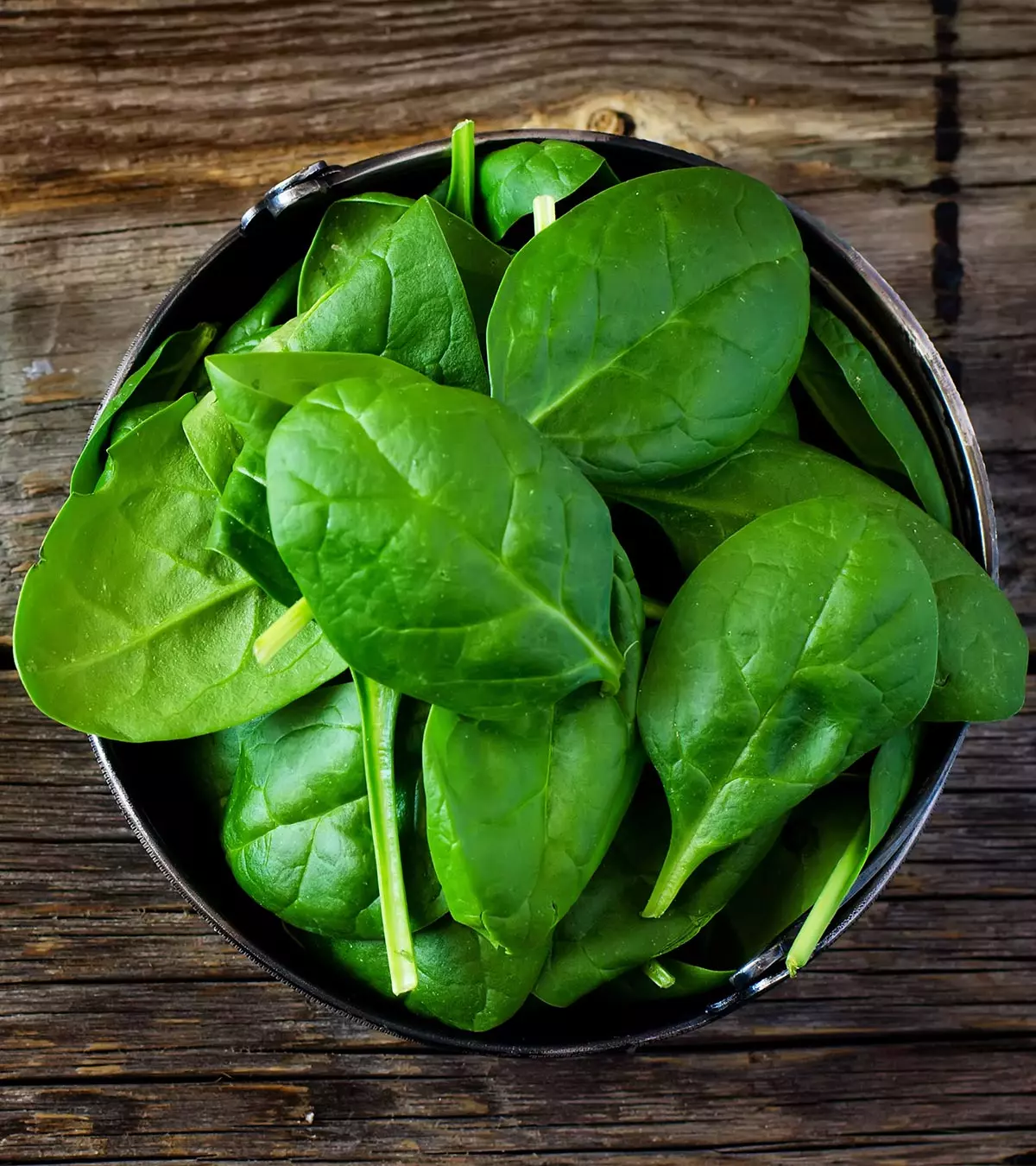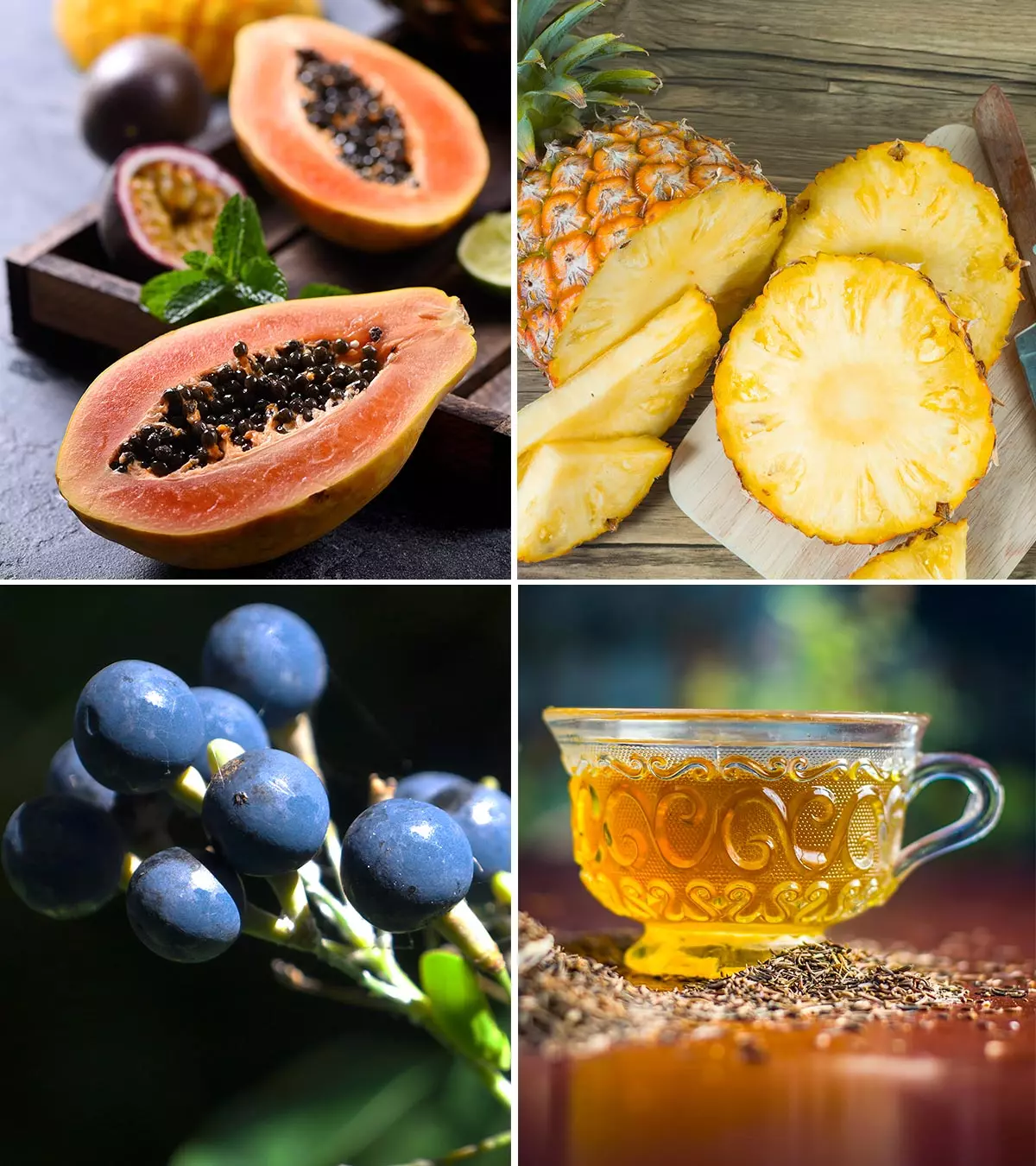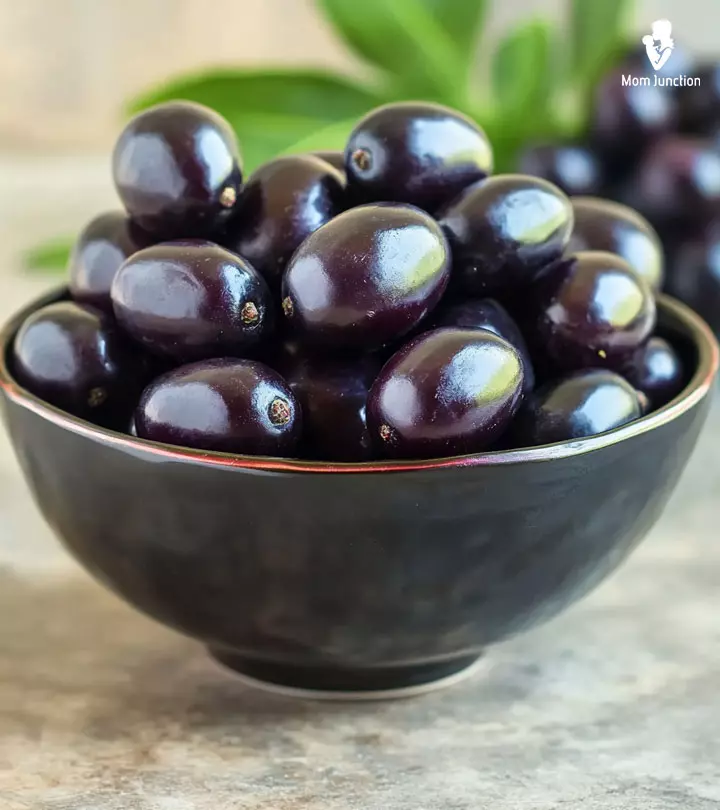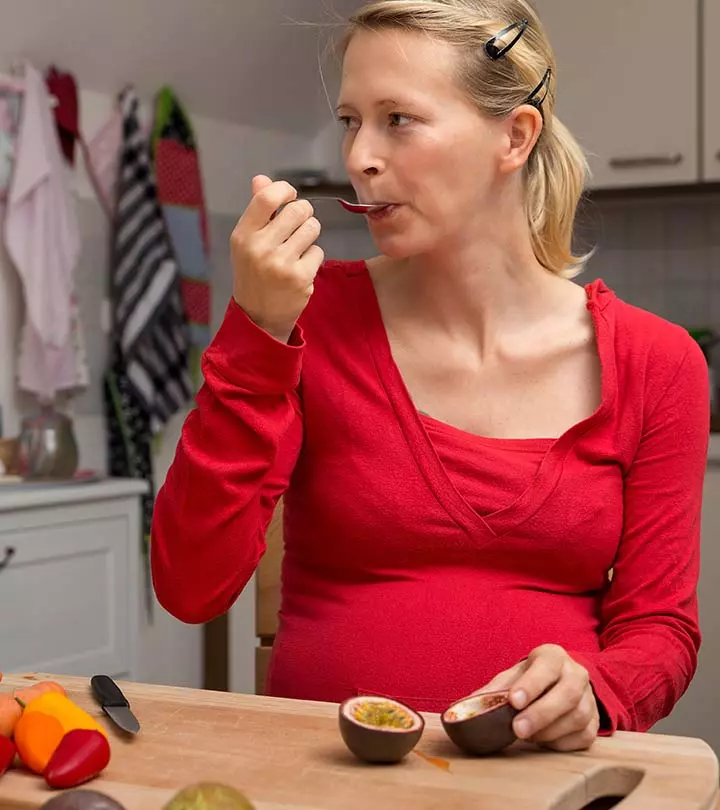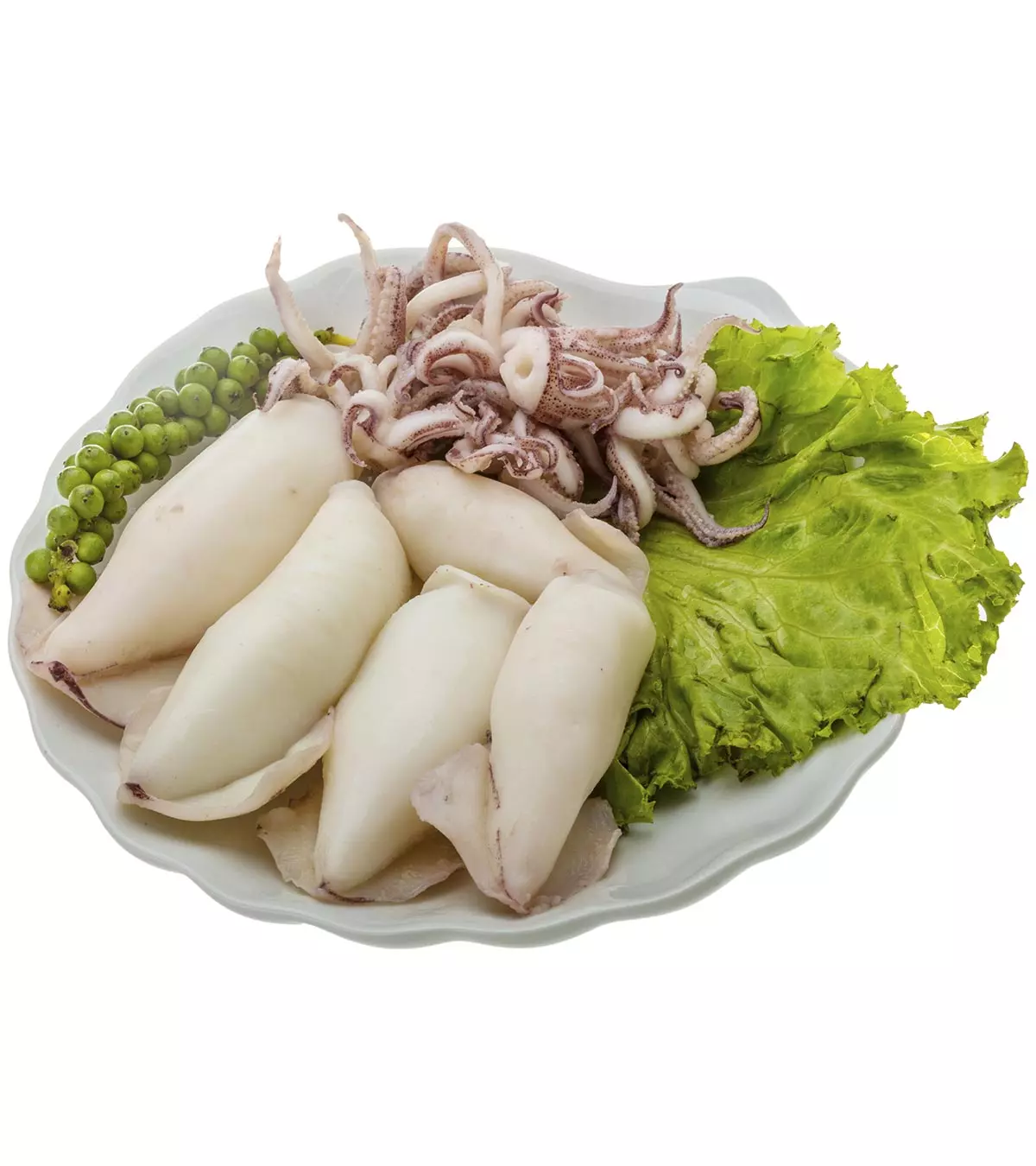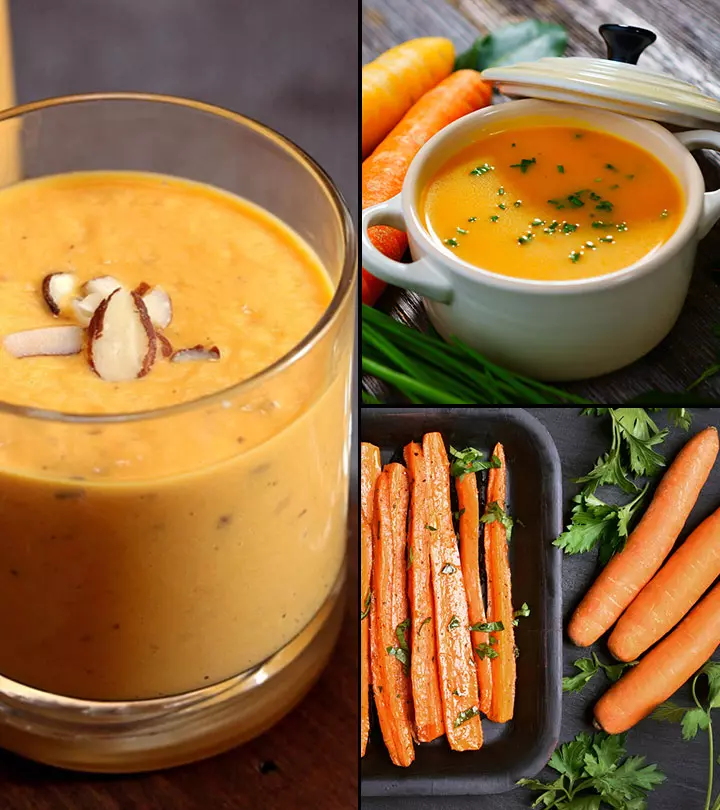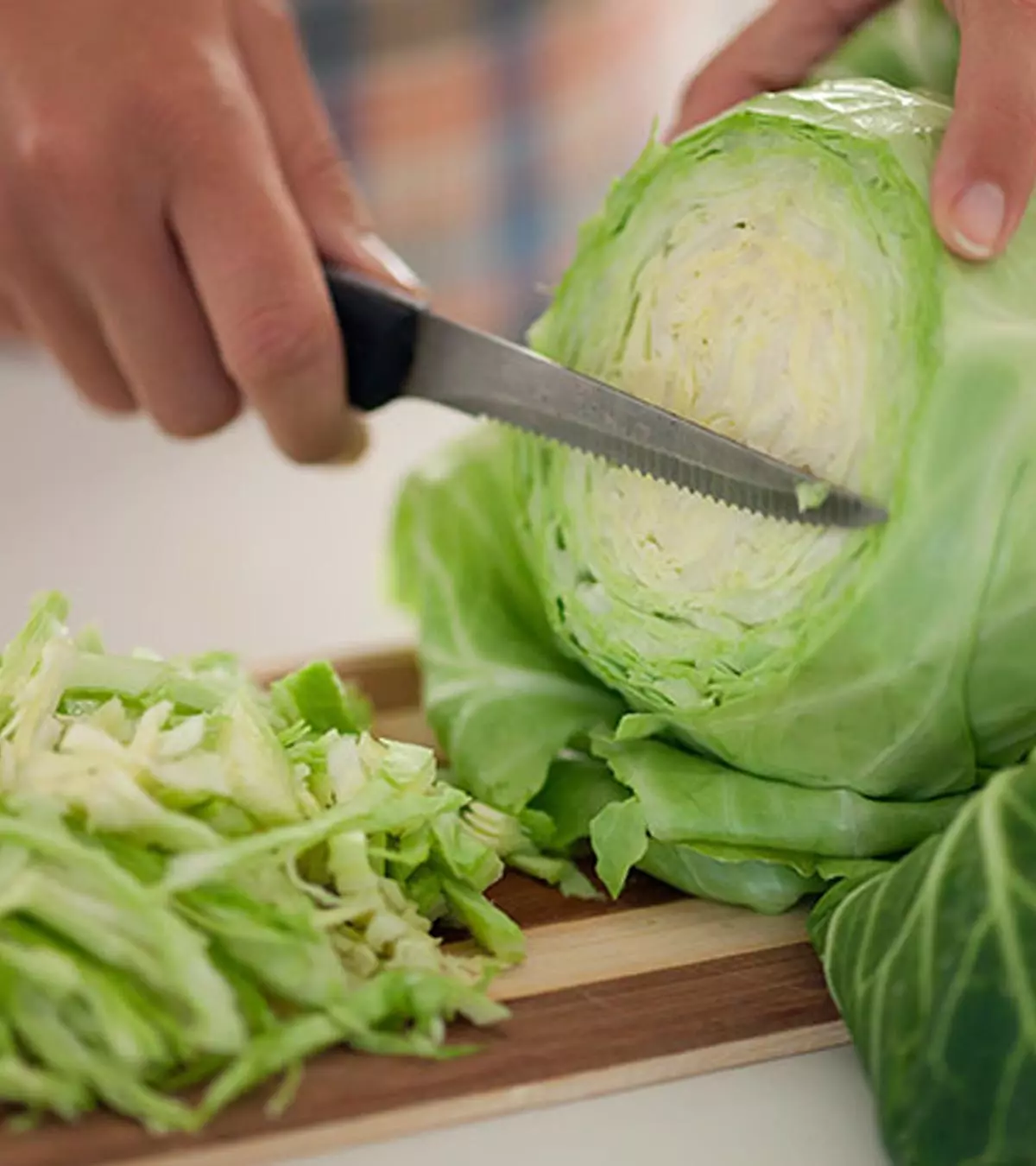
Image: ShutterStock
Cabbage is a nutritious vegetable rich in potassium, phosphorus, and vitamin C. It has a sweet-bitter taste and crunchy texture that several people like. However, since it is known to cause gastric discomfort, you may want to know if eating cabbage during pregnancy is a safe choice.

Cabbage is also considered a goitrogenic food that might interfere with thyroid functioning. So, keep reading as we tell you about the safety of cabbage for expectant mothers, its possible health benefits and side effects, and safe ways to include cabbage in your pregnancy diet.
Key Pointers
- Cabbage is a nutrient and fiber-rich vegetable that offers several health advantages for pregnant women.
- It benefits bone and DNA health, boosts immunity, aids digestion, and helps manage blood pressure.
- Cabbage is low in calories and can be consumed in various forms, including juiced, raw, or incorporated into different cuisines.
- However, excessive consumption of cabbage during pregnancy may exacerbate thyroid issues and lead to gas buildup.
Is It Safe To Eat Cabbage During Pregnancy?
Yes, it is safe to eat cabbage during pregnancy as it is rich in nutrients and offers numerous health benefits (1). Cooked cabbage is always safer than raw cabbage leaves as it minimizes the risk of food-borne diseases (2).
Raw cabbage may contain microbes that could result in food-borne diseases such as listeria infectionsiFood poisoning caused by consuming foods contaminated with Listeria bacteria during pregnancy , which can cause premature birth, miscarriage and also stillbirth (3).
Cooked cabbage is safe and can be included in the maternal diet. It also offers a few health benefits for pregnant women.
 Expert says
Expert saysWhat Are The Health Benefits Of Cabbage During Pregnancy?
, a registered dietitian from Dalton, Georgia, says, “Cabbage is a highly nutritious vegetable that offers several benefits during pregnancy. It is rich in essential vitamins like vitamin C, which supports immune function, and vitamin K, which aids in blood clotting. Cabbage is also a good source of dietary fiber, helping to relieve constipation, a common pregnancy issue. The folate in cabbage supports neural tube development, reducing the risk of birth defects.”
Here are a few notable benefits of including cabbage in your pregnancy diet.
- Good for digestion: Cabbage contains a high amount of dietary fiber, which helps regulate bowel movement and digestion (4). Constipation is one of the common problems of pregnancy, and a regular diet, including cabbage, can mitigate it.

- Improves DNA health: Cabbage is a rich source of folate or folic acid, which is essential for building up the fetal DNA. It, therefore, helps in protecting your baby from neural tube congenital deformities.
- Low in calories: Cabbage is a low-calorie food (5) and thus helps manage weight during pregnancy. So, if you want to gain minimal weight during pregnancy, include cabbage in your diet.
- Prevents gestational diabetes: The high dietary fiber content in cabbage manages blood sugar levels and lowers the risk of gestational diabetes (6).
- Anticancer agents: Purple cabbage contains anticancer agents called anthocyanins (7).
- Improves bone health and immunity: Cabbage contains healthy levels of vitamin K and vitamin C. While vitamin K makes bones stronger (9), vitamin C helps in improving immunity (8).
- Manages blood pressure: Cabbage is rich in electrolytes and minerals such as iron, calcium, potassium, magnesium, and phosphorus that play a key role in regulating (9).

- Lowers the risk of pregnancy anemia: Iron deficiency in pregnancy can lead to anemia. According to the Pan American Health Organisation (PAHO), in 2019, the prevalence of anemia was higher in pregnant women (18.9%) as compared to non-pregnant women (15.3%). Thus, adding cabbage to your pregnancy diet may be a good idea (10).
- Cabbage leaves for pregnancy edema: Cabbage leaves are useful for drawing out the excess liquid from the body. It is therefore helpful in reducing swelling, which happens during and after pregnancy. Wrapping cabbage leaves around the swollen areas helps ease the pain and discomfort. Change the leaves once they turn wet and repeat it twice a day. It also helps reduce breast engorgementiDevelopment of hard, tender breasts due to breast milk accumulation after delivery (11).
Sharing her views on how she tried different techniques for pregnancy edema and finally found quick results from cabbage leaves, a mother, Sarah, says, “Wrap cabbage leaves around swollen areas and leave it on until the leaves get wet.
Believe it or not, the cabbage worked pretty well. Mine was fresh, but other schools of thought say to cook and cool the leaves first. Well, I’m no expert, so don’t take it from me, but the leaves are worth checking out for yourself (i).”
That is not all. Cabbage is also rich in several other nutrients that are essential during pregnancy. Read on to know.
What Is The Nutritional Value Of Cabbage?
According to the USDA, the nutrition present in 100g of raw cabbage is as follows (12):
| Nutrient | Quantity |
|---|---|
| Calories | 25kcal |
| Carbohydrates | 5.8g |
| Protein | 1.28g |
| Fiber | 2.5g |
| Fat | 0.1g |
| Vitamins | |
| Vitamin A98IU | 98IU |
| Vitamin C | 36.6mg |
| Vitamin K | 76mcg |
| Folate | 43mcg |
| Pyridoxine | 0.124mg |
| Niacin | 0.234mg |
| Riboflavin | 0.04mg |
| Thiamin | 0.061mg |
| Electrolytes | |
| Potassium | 170mg |
| Sodium | 18mg |
| Minerals | |
| Calcium | 40mg |
| Iron | 0.47mg |
| Magnesium | 12mg |
| Zinc | 0.18mg |
| Phosphorus | 26mg |
g=grams; mg=milligrams; mcg=micrograms
Although nutritious, cabbage can pose some risks when taken in excess amounts.
What Are The Risks Of Consuming Cabbage During Pregnancy?
Following are some side-effects of cabbage, if consumed too much:
- Leads to gas formation: Overconsumption might lead to flatulenceiRelease of gas from the gastrointestinal system through the anal passage , severe gas, and abdominal pain. Therefore, it is better to limit your intake of cabbage if you are prone to gas problems (13).

- Aggravates thyroid problems: Cabbage is a goitrogenic food, which means it interferes with the thyroid gland functioning. Wash, boil, and cook the cabbage properly to reduce its goitrogenic effect (14).
Another way to minimize the risks of eating cabbage is to pick the right variety of this vegetable.
 Be watchful
Be watchfulHow To Choose A Perfect Cabbage?
Keep the below points in mind while buying cabbage:
- Go for fresh cabbages with no limp or wilted leaves, black or brown blemishes or spots.
- The head of the cabbage should be compact and large with tender green layers of leaves.
- The bottom should not be separate from the stem, and the leaves must be intact.
- When you hold a cabbage, it should feel heavy.
- In red or green cabbages, the leaves are compact and tightly furled. But the other varieties such as Savoy and Napa cabbage have softer leaves, and they are not tightly furled.
So, if you are not fond of the green variety, is it a good idea to include purple cabbage in your pregnancy diet?
Green Vs. Red/ Purple Cabbage – Which Is The Healthier One?
There are almost 400 varieties of cabbage in the world. Among them, red and green are the popular varieties. Though both are nutritious, they are not the same.
| Property | Green (white) cabbage | Red or purple cabbage |
|---|---|---|
| Vitamin C (one cup serving) | Provides 47% of RDA | Provides 85% of RDA |
| Vitamin A (one cup serving) | Provides 3% of RDA | Provides 33% of RDA |
| Vitamin K (one cup serving) | Provides 57% of RDA | Provides 28% of RDA |
| Iron (one cup serving) | Provides 0.4mg | Provides 0.7mg |
| Anthocyanins | Not found | They are present in this due to the color of the cabbage and have antioxidant properties |
| Leaves | Wide-fan like leaves with a rubbery texture | Smaller and denser leaves |
| Eating options | Used in stir-fries, braises, soups, and rolls | Used in Coleslaw and leafy green salads |
Ideally, it is best to include both varieties in your diet for maximum benefit. However, it is essential to know how to consume either variety safely.
Safe Ways To Consume Cabbage In Pregnancy
- You can consume steamed, boiled, sautéed and roasted cabbage.
- Choose organic varieties over raw or stuffed cabbage varieties as they can reduce the risk of food-borne illnesses.
- Also, cooking cabbage for prolonged periods is not advisable as it alters the nutritional value of the vegetable.
- Make sure to wash and cook it thoroughly to remove the toxins and microbes.
- Do not buy shredded or halved cabbage as the vitamin C content reduces once it is cut.
Here are some simple ways to include cabbage in your diet as a part of your prenatal nutrition.
- Roast chopped cabbage and drizzle it with olive oil, minced garlic and cracked black pepper.
- Add to any stew or soup while cooking.
- Add boiled cabbage to a fresh leafy salad.
 Quick fact
Quick fact1. Cabbage soup
This warm soup can relieve cold during pregnancy.
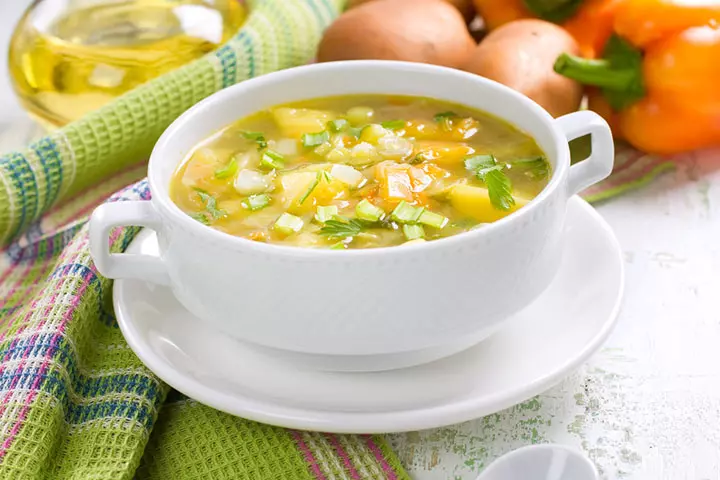
You will need:
- ½ cabbage, finely chopped
- ½ onion, chopped
- 400g tomatoes, chopped
- 3tbsp olive oil
- 2l water
- 2 cloves garlic, finely chopped
- 1/2tsp black pepper, freshly minced
- 1tsp salt
How to:
- Heat olive oil in a large saucepan.
- Add onion, garlic and cook for five minutes.
- Add water, salt, and pepper and bring it to boil.
- While the water is boiling, add cabbage and bring it to simmer until it wilts.
- Add tomatoes, let them boil.
- Simmer for 15 to 30 minutes while stirring continuously.
Preparation time:
55min
Servings: 8
2. Cabbage pancakes
A simple dish that can be prepared in a jiffy.
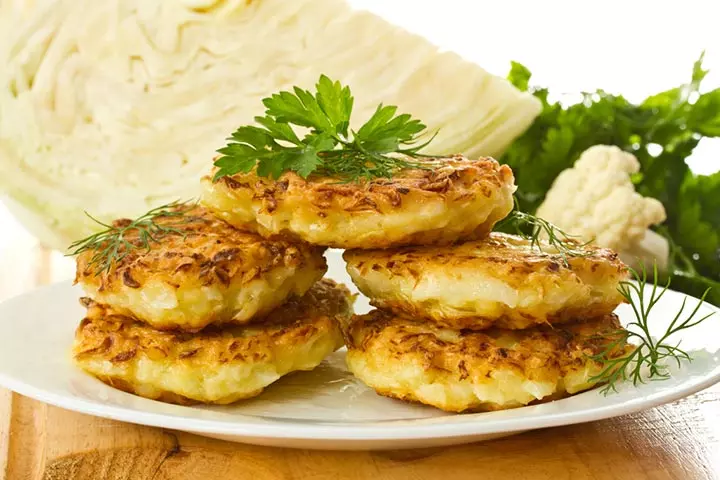
You will need:
- 1 cup cabbage, grated
- ½ cup Bengal gram flour
- 1 onion, chopped
- 2 green chilies, chopped
- ½tsp cumin seeds, crushed
- 1tsp turmeric
- ½tsp ginger, grated
- 2tbsp coriander, chopped
- Salt to taste
How to:
- Add all the ingredients in a large bowl and mix them using water to make a thick batter.
- Heat the non-stick pan and apply some oil.
- Add one-quarter of batter on it.
- Flip it so that both sides of the pancakes are cooked until golden brown.
- Take off the pan and serve hot with pickle or ketchup.
Preparation time:
5min
Servings: 4
If you dislike or are allergic to cabbage, check with your doctor before giving it a try. Experimenting with your diet during these important months is not recommended.
Frequently Asked Questions
1. How much fiber does cabbage provide?
Cabbage is a fiber-rich food. One cup serving of chopped cabbage offers two grams of fiber, which constitutes 9% of the recommended daily value of 25 grams of fiber (15).
2. Can thyroid patients eat cabbage?
Cabbage is a goitrogenic food that interferes with thyroid functioning. It can block the thyroid’s potential to utilize iodine which otherwise helps in the normal functioning of the gland. You should avoid cabbage if you are having hypothyroidism as it can further slow down hormone production (16).
3. Does cabbage cause constipation during pregnancy?
Cabbage contains dietary fiber, which is pivotal in improving bowel activity. In fact, it bulks up the stool, which makes it a great food for constipation (17).
4. Can you eat coleslaw when pregnant?
Coleslaw is a salad containing finely shredded raw cabbage along with other vegetables, mayonnaise or vinaigrette. It is good to avoid coleslaw during pregnancy as it contains raw cabbage and can trigger food poisoning, which can put the unborn baby at risk (18).
5. Is cabbage good for the uterus?
Cabbage is beneficial for the uterus due to its ability to reduce the risk of fibroids in the uterus by getting rid of excessive estrogen in the body (22).
Cabbage is a nutritious vegetable that provides several nutrients, dietary fiber, and health-promoting bioactive compounds. You can consume cabbage during pregnancy as a part of a well-balanced diet containing foods from various food groups. Regular intake of cabbage promotes digestion and improves overall health. Eating cooked cabbage is safer as raw cabbage poses a risk of food-borne illnesses. However, for your salad, you may consider other raw vegetables during pregnancy by taking necessary precautions. Alternatively, Cabbage curry, cabbage soup, and cabbage pancake are some delectable cabbage dishes you can relish during pregnancy.
Infographic: How To Choose And Eat Cabbage Safely During Pregnancy?
Cabbage is a nutrient-rich green vegetable that can be eaten raw or cooked. But, when pregnant, you need to watch your intake. Check out the infographic below for some healthy tips and suggestions to buy and eat cabbage safely when pregnant.
Some thing wrong with infographic shortcode. please verify shortcode syntaxIllustration: Proven Health Benefits Of Eating Cabbage During Pregnancy
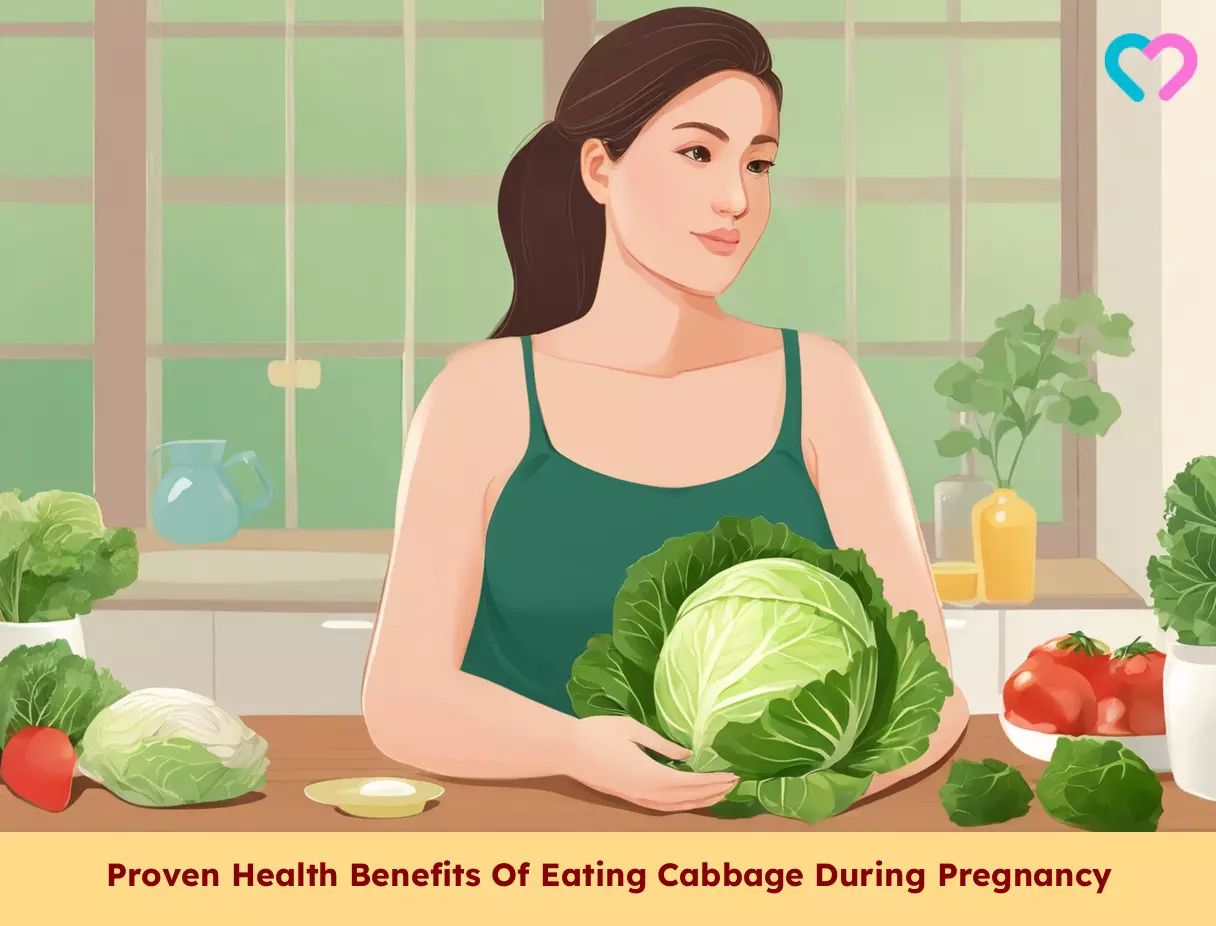
Image: Stable Diffusion/MomJunction Design Team
Personal Experience: Source
MomJunction articles include first-hand experiences to provide you with better insights through real-life narratives. Here are the sources of personal accounts referenced in this article.
i. Big fat pregnancy feet.https://callmequirky.wordpress.com/2013/08/18/big-fat-pregnancy-feet/
References
- My Pregnancy Plate.
https://www.ohsu.edu/doernbecher - Fruit and Vegetable Safety.
https://www.foodsafety.gov/blog/fruit-and-vegetable-safety#:~:text=manage%20your%20weight.-,Sometimes%2C%20raw%20fruits%20and%20vegetables%20contain%20harmful%20germs%20that%20can,the%20next%20safest%20is%20washed. - Qi Zhu et al. (2017); Listeria monocytogenes in Fresh Produce: Outbreaks Prevalence and Contamination Levels.
https://www.ncbi.nlm.nih.gov/pmc/articles/PMC5368540/ - 8 Health Benefits of Cabbage.
https://health.clevelandclinic.org/benefits-of-cabbage - Cabbage.
https://dpi.wi.gov/sites/default/files/imce/school-nutrition/pdf/fact-sheet-cabbage.pdf - Managing Gestational Diabetes.
https://www.nichd.nih.gov/sites/default/files/publications/pubs/Documents/managing_gestational_diabetes.pdf - Li-Shu Wang and Gary D. Stoner; (2009); Anthocyanins and their role in cancer prevention
https://www.ncbi.nlm.nih.gov/pmc/articles/PMC2582525/ - What you should know about: Vitamin C.
https://www.health.harvard.edu/staying-healthy/what-you-should-know-about-vitamin-c - Beating high blood pressure with food
https://www.health.harvard.edu/newsletter_article/beating-high-blood-pressure-with-food - Chander Shekhar Gautam et al.; (2008); Iron Deficiency in Pregnancy and the Rationality of Iron Supplements Prescribed During Pregnancy.
https://www.ncbi.nlm.nih.gov/pmc/articles/PMC2644004/ - A Mooventhan and L Nivethitha; (2014); Scientific Evidence-Based Effects of Hydrotherapy on Various Systems of the Body.
https://www.ncbi.nlm.nih.gov/pmc/articles/PMC4049052/ - Cabbage raw.
https://fdc.nal.usda.gov/fdc-app.html#/food-details/169975/nutrients - Common Pregnancy Problems Or Discomforts.
https://hospital.uillinois.edu/primary-and-specialty-care/family-birth-place/prenatal-care/your-pregnancy-overview/common-pregnancy-problems-or-discomforts - Jagminder K. Bajaj et al. (2016); Various Possible Toxicants Involved in Thyroid Dysfunction: A Review.
https://www.ncbi.nlm.nih.gov/pmc/articles/PMC4740614/ - Harvesting And Storing Fresh Garden Vegetables.
https://www.uidaho.edu/extension/publications - R Lakshmy et al.; (1995); Iodine metabolism in response to goitrogen induced altered thyroid status under conditions of moderate and high intake of iodine
https://pubmed.ncbi.nlm.nih.gov/8575723/ - Constipation – self-care
https://medlineplus.gov/ency/patientinstructions/000120.htm - Food Safety During Pregnancy
https://extension.colostate.edu/docs/pubs/foodnut/09372.pdf - Leafy Vegetables.
https://www.cdc.gov/restaurant-food-safety/php/practices/leafy-vegetables.html - 8 Health Benefits Of Cabbage.
https://health.clevelandclinic.org/benefits-of-cabbage - Feng Xu, et al; (2014); Domestic cooking methods affect the nutritional quality of red cabbage.
https://pubmed.ncbi.nlm.nih.gov/24837935/ - Can Certain Foods Reduce Uterine Fibroids?
https://health.clevelandclinic.org/foods-to-reduce-uterine-fibroids
Community Experiences
Join the conversation and become a part of our nurturing community! Share your stories, experiences, and insights to connect with fellow parents.
Read full bio of Dr. Shikha Sharma
- Trista Best is a registered dietitian at Balance One Supplements, Environmental Health Specialist, and Adjunct Nutrition Professor. She completed her Masters of Public Health Nutrition from Liberty University and BS Dietetics from the University of Alabama before getting Dietitian Registration in 2018.
 Trista Best is a registered dietitian at Balance One Supplements, Environmental Health Specialist, and Adjunct Nutrition Professor. She completed her Masters of Public Health Nutrition from Liberty University and BS Dietetics from the University of Alabama before getting Dietitian Registration in 2018.
Trista Best is a registered dietitian at Balance One Supplements, Environmental Health Specialist, and Adjunct Nutrition Professor. She completed her Masters of Public Health Nutrition from Liberty University and BS Dietetics from the University of Alabama before getting Dietitian Registration in 2018.
Read full bio of Swati Patwal
Read full bio of Rebecca Malachi
Read full bio of Reshmi Das






